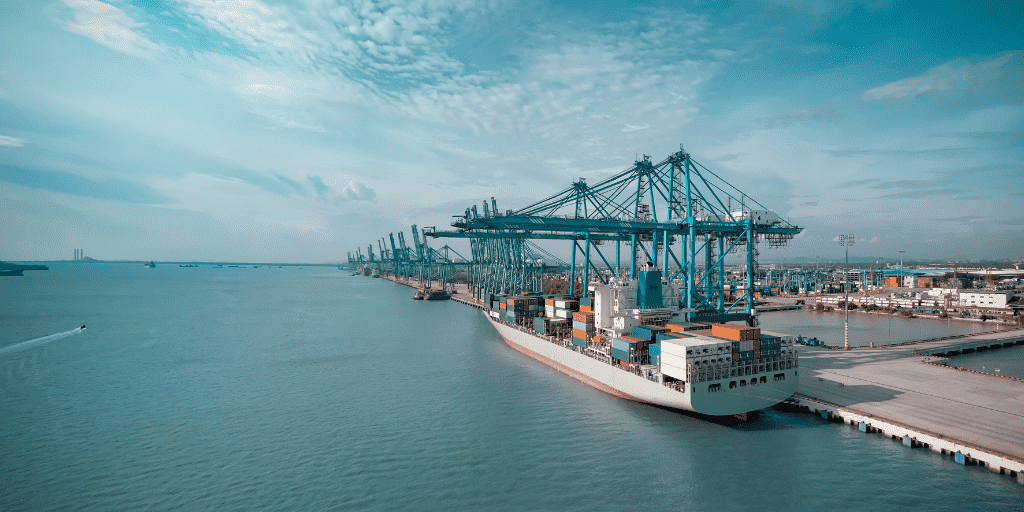In the bustling metropolis of Melbourne, a complex dance of goods, services, and resources unfolds every day, orchestrated by the intricate web of supply chains and logistics networks that crisscross the cityscape. However, beneath the surface of this urban symphony lies a symphony of challenges that continually test the resilience and adaptability of these vital systems. From congested roadways and port bottlenecks to evolving consumer demands and global disruptions, Melbourne’s supply chain struggles have taken on a life of their own, shaping the way businesses operate and affecting the lives of its residents. In this exploration, we delve into the ongoing logistic challenges that Melbourne faces, uncovering the multifaceted issues that underscore the city’s intricate logistics landscape. Join us as we unravel the complexities, shed light on the obstacles, and glimpse the potential solutions that can steer Melbourne’s supply chains toward a more seamless future.
Melbourne’s Growing Freight Task
As Melbourne continues to expand and develop as a thriving urban hub, its growing freight task has become an undeniable reality that presents both opportunities and challenges. The city’s flourishing economy, coupled with its increasing population and consumption patterns, has placed substantial demands on its freight infrastructure. This surge in demand for goods transportation has led to a remarkable transformation in the logistics landscape.
From a positive perspective, Melbourne’s growing freight task signifies a vibrant economy that is continually evolving to meet the needs and desires of its residents. The influx of goods reflects the city’s status as a center of commerce, where businesses strive to provide a diverse range of products and services to a discerning customer base. This phenomenon not only supports local industries but also fuels job creation and economic growth, contributing to the overall prosperity of the region.
However, this surge in freight volume also brings forth a set of complex challenges that demand innovative solutions. One of the most prominent issues is the strain placed on the city’s existing infrastructure, including roadways, ports, and distribution centers. Congestion and bottlenecks have become all too common, leading to delays in delivering goods and a potential increase in operational costs for businesses. Furthermore, the environmental impact of this increased freight movement cannot be ignored, as it contributes to traffic emissions and other sustainability concerns.
To address these challenges and harness the potential benefits, Melbourne’s authorities and stakeholders are compelled to think creatively and strategically. The adoption of advanced technologies, such as smart traffic management systems and data analytics, can help optimize freight movement and alleviate congestion. Investments in alternative transportation modes, such as rail and intermodal facilities, can reduce the burden on road networks and minimize environmental impacts. Additionally, fostering collaboration between various sectors, including government bodies, businesses, and logistics providers, can lead to more efficient and sustainable freight solutions.
In essence, Melbourne’s growing freight task encapsulates the dynamic nature of modern urban environments. It serves as a barometer of the city’s economic vigor while also highlighting the need for adaptive and forward-thinking approaches to address the associated challenges. By embracing innovation, collaboration, and a holistic view of sustainable development, Melbourne can navigate its burgeoning freight landscape to create a harmonious balance between economic progress and environmental responsibility.
Logistic Challenges
One of the foremost challenges that Melbourne faces in its logistic landscape is the battle against congestion. The city’s roadways, once arteries of smooth transport, now find themselves clogged with a deluge of vehicles, from freight trucks to personal cars. This congestion not only leads to delays in delivering goods but also contributes to environmental issues and heightened stress levels among commuters. The need to find efficient ways of unclogging these logistical arteries is of paramount importance.
Moreover, the rise of e-commerce and the evolving preferences of modern consumers have added a layer of complexity to Melbourne’s logistic challenges. The demand for fast and flexible deliveries has placed pressure on supply chains, urging businesses to adapt to just-in-time models while also managing the increased returns and reverse logistics associated with online shopping.
The city’s expansive port facilities, while instrumental in connecting Melbourne to the global economy, also present their own set of challenges. Port congestion, berthing delays, and handling inefficiencies have the potential to disrupt the smooth flow of goods in and out of the city, affecting not only local businesses but also international trade relationships.
As Melbourne embraces its role as a major player in the Asia-Pacific region, it faces the challenge of maintaining resilience in the face of external shocks. Global events, such as the recent pandemic and geopolitical shifts, have revealed the vulnerabilities in the city’s supply chains, prompting a need for diversification and risk mitigation strategies.
In this backdrop, collaboration emerges as a key enabler for addressing these ongoing logistic challenges. Government bodies, businesses, transport operators, and technology innovators must work hand in hand to create a holistic approach that encompasses infrastructure development, policy reform, and the implementation of cutting-edge solutions like smart logistics platforms and data-driven decision-making.
Melbourne’s ongoing logistic challenges are not just hurdles to overcome; they represent opportunities for the city to innovate, adapt, and position itself as a model for modern, sustainable urban logistics. By addressing these challenges with foresight and determination, Melbourne has the chance to redefine the way goods move through its streets, fostering economic growth, environmental responsibility, and an enhanced quality of life for its residents.
Logistic Opportunities
The most promising opportunities arise from the convergence of technology and logistics. The rise of digitalization, data analytics, and the Internet of Things (IoT) presents a chance to revolutionize how goods are transported, tracked, and managed. Smart logistics solutions can offer real-time visibility into supply chains, enabling businesses to make informed decisions, optimize routes, and reduce wastage. Melbourne’s thriving tech ecosystem can be leveraged to develop and implement these solutions, enhancing the efficiency and transparency of its logistic networks.
The city’s strategic location in the Asia-Pacific region positions it as a hub for international trade. Leveraging this advantage, Melbourne can become a gateway for goods flowing between Australia, Asia, and beyond. By investing in state-of-the-art port facilities, intermodal transportation systems, and trade infrastructure, the city can attract businesses looking to capitalize on its logistical prowess. This not only stimulates economic growth but also fosters international relationships and partnerships.
The evolving consumer landscape, driven by the rise of e-commerce, opens doors to innovative last-mile delivery solutions. From autonomous delivery vehicles to drone deliveries, Melbourne can embrace these advancements to cater to the changing preferences of its residents. By collaborating with businesses and regulators, the city can create a conducive environment for testing and implementing these novel approaches, leading to faster, more convenient, and eco-friendly deliveries.
Sustainability is another avenue rich with potential. Melbourne’s commitment to reducing its carbon footprint provides an opportunity to reshape logistics practices in alignment with environmental goals. The promotion of eco-friendly transport modes, such as electric and hydrogen-powered vehicles, can significantly reduce emissions and contribute to cleaner air in the city. Additionally, circular economy principles can be integrated into logistics, minimizing waste and optimizing resource utilization.
Collaboration emerges as a central theme when discussing Melbourne’s logistic opportunities. Public-private partnerships, cross-industry collaborations, and stakeholder engagement can foster an ecosystem where innovative ideas flourish, regulatory challenges are addressed, and resources are pooled for the collective betterment of the city’s logistics.
Through embracing technology, optimizing its geographic advantages, catering to evolving consumer demands, and prioritizing sustainability, Melbourne can create a logistical landscape that not only conquers challenges but also propels the city to new heights of efficiency, competitiveness, and environmental responsibility. As it navigates these opportunities, Melbourne has the chance to be a beacon of modern urban logistics, setting an example for cities around the world.
ICS Global Logistics: Empowering Solutions to Melbourne’s Logistics Challenges
In the dynamic realm of logistics, where efficiency, precision, and adaptability reign supreme, ICS Global Logistics stands as a beacon of expertise and innovation, ready to assist businesses and individuals in overcoming the unique challenges posed by Melbourne’s bustling logistics landscape. With a proven track record and a commitment to excellence, ICS Global Logistics offers a range of comprehensive solutions that can effectively address the hurdles faced when navigating Melbourne’s complex logistics environment.
- Tailored Solutions for Diverse Needs: ICS Global Logistics understands that every business and individual has distinct logistics requirements. By offering tailored solutions, they ensure that their services align seamlessly with the specific needs and objectives of each client. Whether it’s optimizing supply chains, managing cargo across borders, or providing specialized delivery services, their team crafts solutions that fit like a glove.
- Navigating Congestion and Delays: Melbourne’s traffic congestion and unpredictable delays can impact logistics operations. ICS Global Logistics leverages their in-depth knowledge of the local landscape to devise optimal routes and strategies. Their real-time tracking capabilities allow you to stay informed about the progress of your shipments, helping you make informed decisions in the face of potential disruptions.
- Transparent Pricing and Cost Management: ICS Global Logistics places transparency at the forefront of their operations. Their commitment to providing clear and comprehensive pricing ensures that you have a full understanding of the costs involved. This transparency extends to outlining potential additional charges, eliminating surprises and enabling you to make budget-conscious decisions.
- Efficiency through Technology: In a digital age, technology is a powerful tool for optimizing logistics processes. ICS Global Logistics harnesses the latest technological advancements to enhance efficiency. From state-of-the-art tracking systems to data-driven analytics, they empower clients with real-time insights that drive informed decision-making and streamline operations.
- Experience and Expertise: With years of experience in Melbourne’s logistics scene, ICS Global Logistics boasts a team of experts who possess an intricate understanding of the city’s logistics challenges. This expertise equips them to proactively address potential obstacles and provide strategic guidance to ensure smooth logistics operations.
- Reliability and Quality Assurance: Ensuring the safe and secure handling of your goods is a top priority for ICS Global Logistics. Their commitment to maintaining rigorous quality standards, combined with their dedication to continuous improvement, gives you peace of mind that your shipments will arrive in optimal condition.
- Collaboration and Customer-Centric Approach: ICS Global Logistics places collaboration at the core of their operations. By engaging in open communication, understanding your unique needs, and building strong partnerships, they create a customer-centric experience that fosters trust and mutual success.
In essence, ICS Global Logistics has positioned itself as a trusted partner for businesses and individuals seeking to conquer the logistical challenges posed by Melbourne’s dynamic environment. With a focus on tailored solutions, technological prowess, and a commitment to transparency, they offer a pathway to seamless logistics operations that optimize efficiency, mitigate challenges, and drive growth. By partnering with ICS Global Logistics, you gain more than a logistics provider – you gain a strategic ally in your journey toward logistical excellence in Melbourne.
Get a Quote
Vision for Melbourne’s Logistic Future
As Melbourne’s economic and urban landscape continues to flourish, so does the need for a logistics system that can support this growth. The challenges that Melbourne faces in its logistics domain are not insurmountable obstacles but stepping stones toward progress. By embracing innovation, fostering collaboration, and investing in the future, Melbourne has the potential to redefine its logistic landscape. The city’s journey forward is one of adaptability, sustainability, and resilience, where the challenges of today become the catalysts for a more efficient, interconnected, and responsive logistical future.

